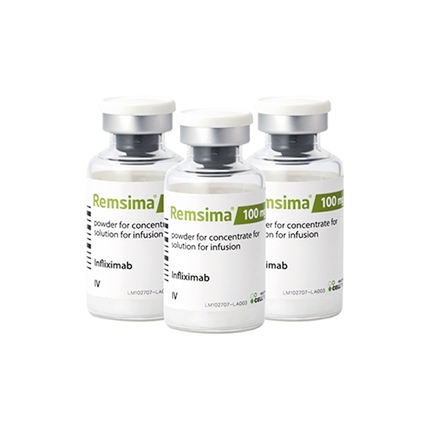- Bone Health
- Immunology
- Hematology
- Respiratory
- Dermatology
- Diabetes
- Gastroenterology
- Neurology
- Oncology
- Ophthalmology
- Rare Disease
- Rheumatology
Inflectra Stands Out in Meta-analysis of Agents for Crohn Disease
Investigators ranked biologics and Janus kinase 1 inhibitors based on past findings.
Investigators who performed a systematic review and network meta-analysis of treatments for Crohn disease (CD) ranked adalimumab higher than other treatments for the induction of remission and the infliximab biosimilar CT-P13 (Inflectra, Remsima) highest for both maintenance of remission and steroid-free remission. The authors concluded, based on currently available data, adalimumab and CT-P13 should be recommended for treatment of active CD.
Providing justification for the study, the researchers noted that the relative efficacy and safety of biologics, biosimilars, and Janus kinase 1 (JAK1) inhibitors has been unclear, “due to a lack of high-quality, head-to-head randomized controlled trials.”
Although previous studies demonstrated biologics inhibiting tumor necrosis factor alpha (TNF) were superior to immunosuppressive agents, they said, there is a lack of direct comparisons between newer therapies, such as biosimilars and small-molecule JAK1 inhibitors, and traditional biologics.
The authors evaluated 29 randomized controlled trials (RCTs) on anti-TNF biologics infliximab, adalimumab, and certolizumab pegol; the infliximab biosimilar CT-P13; the integrin monoclonal antibody vedolizumab; the IL-12/IL-23 monoclonal antibody ustekinumab; and JAK1 inhibitors tofacitinib, filgotinib, and upadacitinib. They excluded the infliximab biosimilar SB2 due to lack of RCTs.
Efficacy outcomes were induction of remission, maintenance of remission, and steroid-free remission; safety outcomes were serious adverse events (AEs) and infections. The researchers used Bayesian methods to make pairwise comparisons between treatments based on a common comparator and ranked the probability of outcomes across all treatments.
Induction of Remission
In the authors’ model, infliximab, adalimumab, CT-P13, vedolizumab, ustekinumab, and filgotinib were significantly superior to placebo for the induction of remission. There was no statistically significant difference between the biosimilar CT-P13 and other biologics for induction of remission.
Pairwise comparisons suggested both infliximab and adalimumab were superior to certolizumab pegol and tofacitinib. The authors reported the rank probability result favored adalimumab over other treatments for induction of remission.
When the authors limited their analysis to biologics-naive patients, “only infliximab and adalimumab showed statistically significant superiority for the induction of remission.”
Maintenance of Remission
The Bayesian model suggested infliximab, adalimumab, certolizumab pegol, CT-P13, vedolizumab, and ustekinumab were superior to placebo for maintaining remission. Furthermore, pairwise comparisons suggested infliximab, adalimumab, certolizumab pegol, CT-P13, and vedolizumab were superior to filgotinib. Upadacitinib was not assessed due to lack of data. The authors said their rank probability results favored CT-P13 and adalimumab over other treatments for maintenance of remission.
Steroid-Free Remission
For steroid-free remission, infliximab, adalimumab, vedolizumab, and CT-P13 were all superior to placebo, with no statistically significant differences between these treatments in the Bayesian model. The difference between ustekinumab and placebo was nonsignificant. Based on the rank probability results, CT-P13 was favored over the other treatments. The authors said they excluded JAK1 inhibitors from the analysis of steroid-free remission because of lack of data.
Safety
In the maintenance phase, rank probability results suggested tofacitinib was associated with a higher probability of infections compared with other treatments, and compared with JAK1 inhibitors, biologics, and the biosimilar CT-P13 were associated with lower probability of AEs and infections.
However, the authors suggested interpreting their safety results regarding JAK1 inhibitors cautiously, “because insufficient real-life data and phase 3 RCT evidence [are] available for evaluating their safety profile.” Furthermore, they acknowledged study findings were limited by a lack of real-world safety data.
CT-P13
The authors noted, “The performance of the novel drug CT-P13 in our study is worthy of mention.” Although there is “little information” about efficacy and safety of CT-P13 compared with treatments other than the infliximab originator or placebo, the authors said their analysis helps to clarify where CT-P13 stands among treatments for CD. They mentioned its lower costs compared with the reference product and reiterated that CT-P13 appeared as effective as other biologics for induction of remission, was favored over all other treatments for maintenance of remission and steroid-free remission, and had lower probability of AEs in their model.
The authors concluded adalimumab, which ranked highest in their model for induction of remission, and CT-P13, which ranked highest for maintenance of remission and steroid-free remission, should be recommended for treatment of active CD. They also said future head-to-head RCTs comparing biologics, biosimilars, and JAK1 inhibitors are warranted.
The authors declared they had “no commercial or financial relationships that could be construed as a potential conflict of interest.”
Reference
Wu G, Yang Y, Liu M, Wang Y, Guo Q. Systematic review and network meta-analysis: comparative efficacy and safety of biosimilars, biologics and JAK1 inhibitors for active Crohn disease. Front Pharmacol. Published online April 14, 2021. doi:10.3389/fphar.2021.655865
Newsletter
Where clinical, regulatory, and economic perspectives converge—sign up for Center for Biosimilars® emails to get expert insights on emerging treatment paradigms, biosimilar policy, and real-world outcomes that shape patient care.

